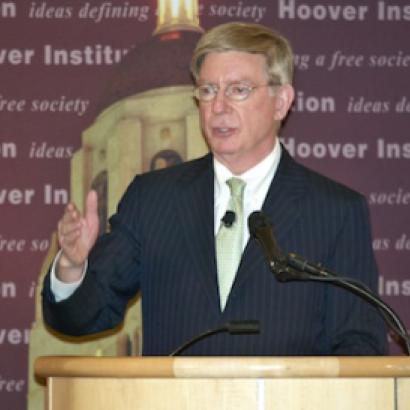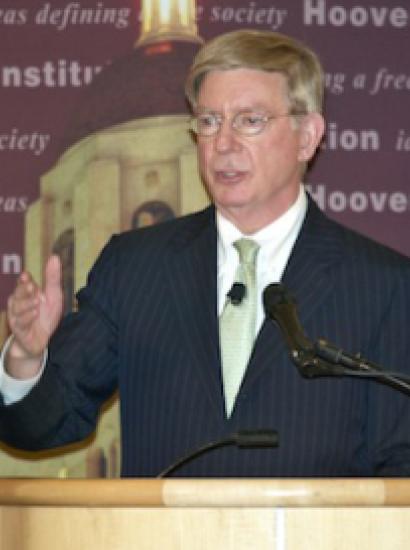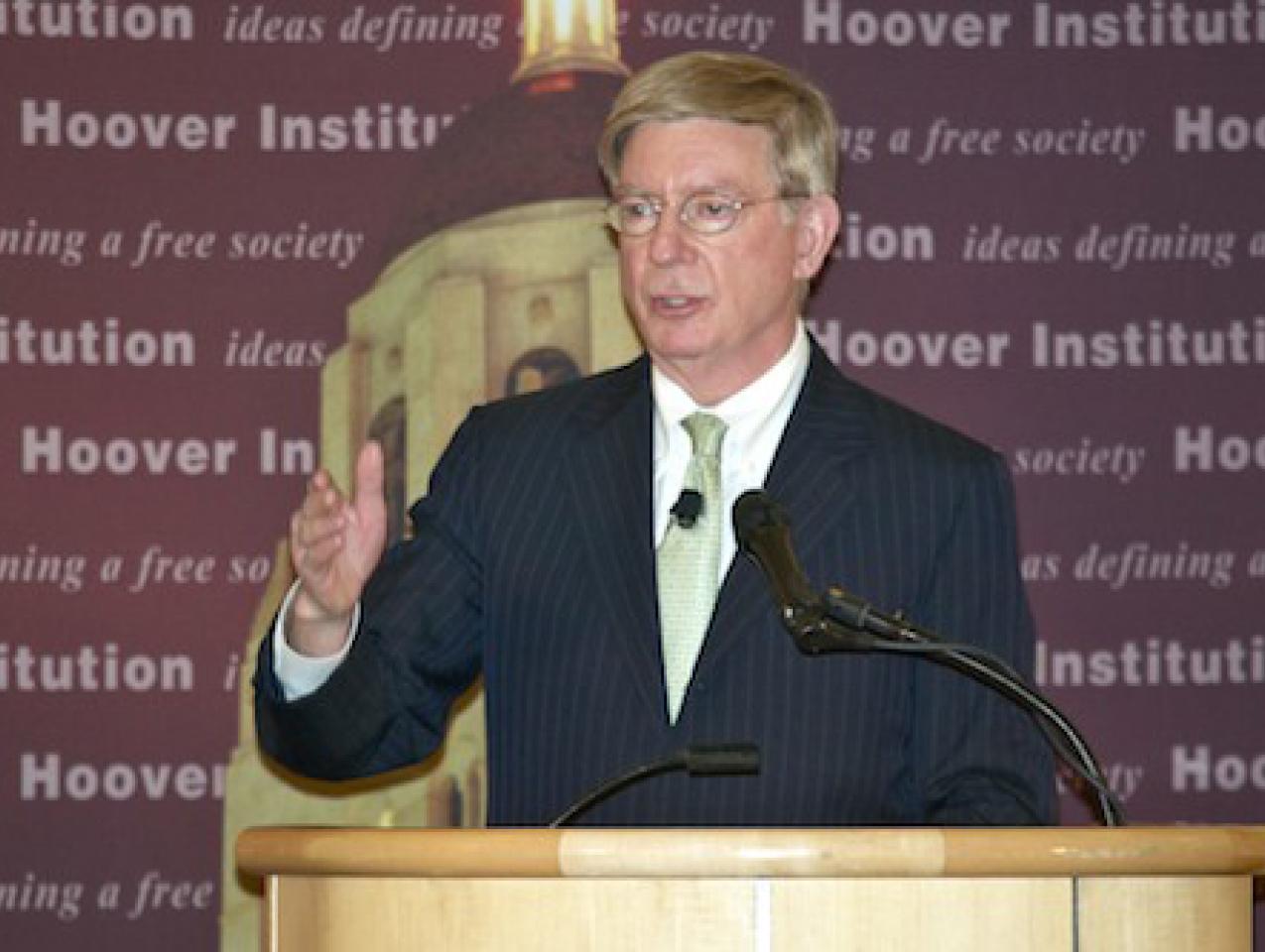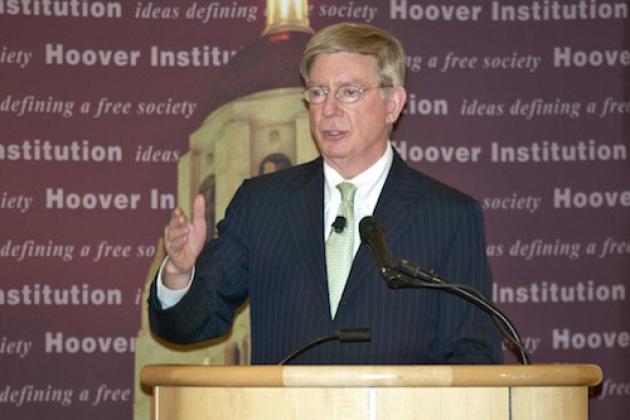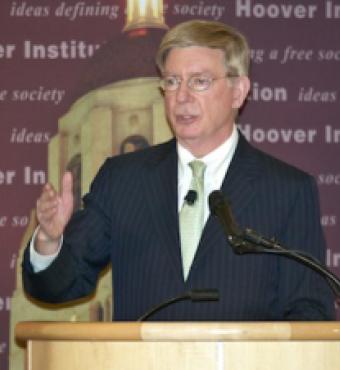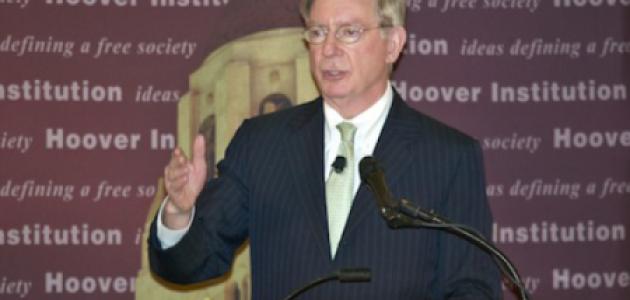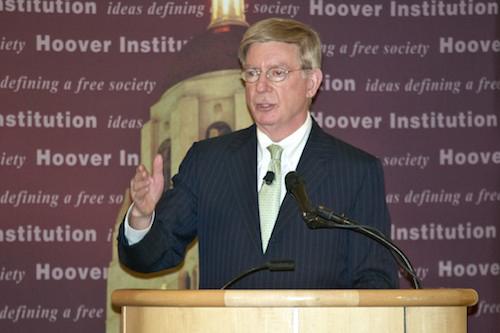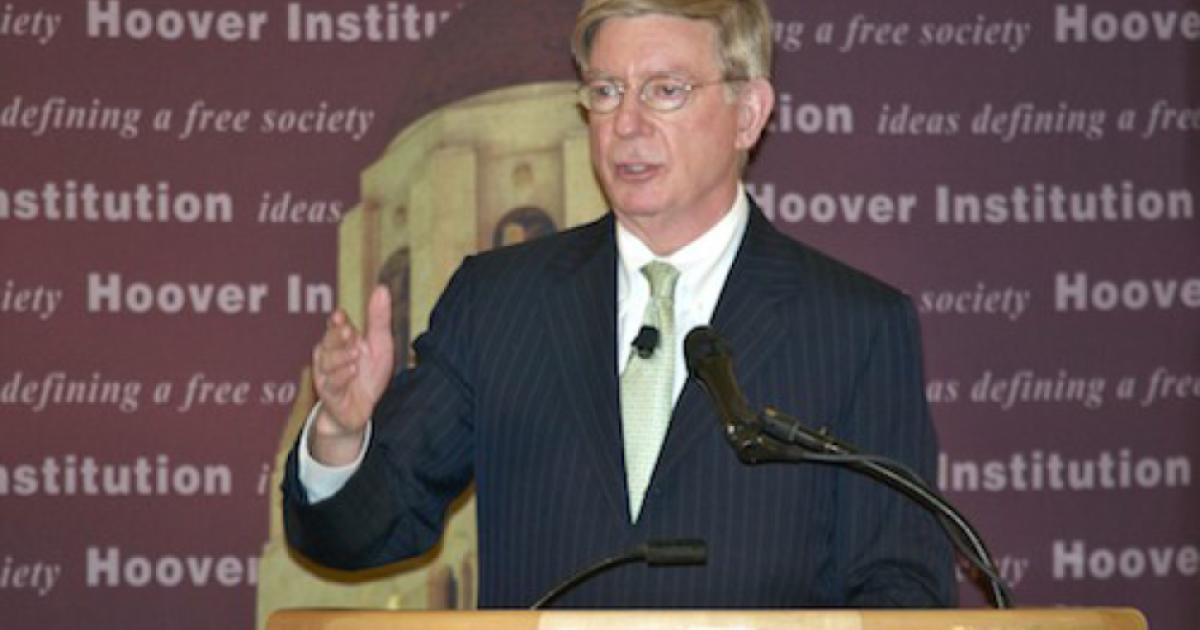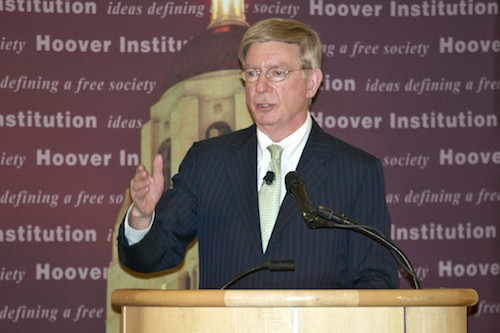
The Hoover Institution Spring 2011 Retreat began on April 17, 2011, with before-dinner remarks by General Stanley McChrystal, a four-star US Army general (retired) and former commander of US and international security forces in Afghanistan.
In his speech, titled “Geopolitical Challenges and Opportunities Facing the United States,” McChrystal discussed the differing perspectives and misunderstandings regarding the issues in Afghanistan and Iran, how important it is to engage in people politics, and the need for understanding so as to build sustainable relationships. By comparing the differing views of Americans and Afghanis and Americans and Iranians, he emphasized the importance of understanding various perspectives. “Now the question is not which perspective is correct because the reality is it doesn’t matter. The reality is that people’s perspectives drive their attitudes and their actions. . . . . Without learning languages, without spending time, without engaging enough, we take very complex problems and we don’t give them all the respect that they need,” McChrystal stated.
On April 18, 2011, Pulitzer Prize–winning columnist George Will gave the before-dinner talk titled “The Political Argument Today.” Will, identifying himself as an “academic political philosopher,” discussed the increase of medical knowledge, arguments about taxation and various taxes, the importance of former president James Madison’s views compared to former president Woodrow Wilson’s, and the concept of American exceptionalism. “When we stick to the Madisonian vision of modest government and avoid the Wilsonian vision of expansive arrogant government, the United States flourishes inevitably,” Will stated.
John Raisian, the Tad and Dianne Taube Director of the Hoover Institution, in his welcoming remarks on Monday morning discussed recent Hoover events, digitizing the treasures in the library and archives, and Hoover’s using communication technology to its advantage. Raisian introduced four speakers: Terry Anderson, William Damon, John Taylor, and Condoleezza Rice, all of whom made remarks at plenary sessions of the retreat. Their topics of discussion were, respectively, environmental markets, education for young Americans, the budget and economic growth, and democracy in the Middle East.
Terry Anderson, the John and Jean De Nault Senior Fellow at the Hoover Institution and cochair of the Property Rights, Freedom, and Prosperity Task Force, discussed environmental changes in his speech titled “A GREEN Tea Party--Serving Budget Cuts and Environmental Quality.” His concrete proposals are to encourage environmental markets, charge public land agencies with making a profit, and promoting economic growth. Anderson emphasized that “wealthier is healthier, especially for the environment,” and that “technological change and economic growth are the driving engines of environmental quality.”
William Damon, a senior fellow at the Hoover Institution and a professor of education at Stanford University, argued that the adult community has a responsibility “to ensure our children, grandchildren, and future generations beyond . . . will enjoy the same privileges” it has experienced. Damon emphasized the importance of virtue, touching on ideas from the Founding Fathers and the Constitution. He discussed Thomas Jefferson’s idea of virtue of devotion and how parents and the family are the keys to fostering progress. Damon talked about a better future for our children, including the “American dream,” exemplified by a young, idealistic female student of Damon’s who still, despite cynics, believes the dream is possible.
John Taylor, the George P. Shultz Senior Fellow in Economics at the Hoover Institution, chair of the Working Group on Economic Policy, and the Mary and Robert Raymond professor of economics at Stanford University, elaborated on “a program to reduce spending and balance the budget without increasing taxes [that] will lower unemployment and increase economic growth.” Taylor emphasized that a credible, transparent strategy is needed to reduce spending; he outlined such a strategy with a step-by-step analysis, using detailed charts, of fiscal year 2011 and the upcoming fiscal year 2012.
Condoleezza Rice, the Thomas and Barbara Stephenson Senior Fellow on Public Policy at the Hoover Institution, professor of political economy in the Stanford Graduate School of Business, and professor of political science at Stanford University, spoke on “Prospects of Democracy: The Middle East and Beyond.” Rice talked about her 2005 visit to Cairo, Egypt, to talk with former Egyptian president Muhammad Hosni Sayyid Mubarak, who, she said, was extremely resistant to her proposals for reformation. In her talk, she also listed factors that would aid both Egypt and Tunisia, including facilitating organization, free trade agreements, and democratic assistance. Rice’s solutions for solving Libya’s problems included the United States’ getting involved, even though it would involve tough choices and US “internal repair.” “People have got to know where the United States of America stands. People have got to know what our objectives are, and people have got to know that we will meet them,” stated Rice.
Hoover fellows Victor Davis Hanson, Michael McConnell, and Shelby Steele gave speeches on Tuesday, April 19, 2011. Their topics included President Barack Obama and the justice system. John Raisian’s opening remarks focused on public policy today, Milton Friedman’s online database and book series project, and Hoover recipients of the Bradley Prize in 2011 and the previous years.
Victor Davis Hanson, the Martin and Illie Anderson Senior Fellow at the Hoover Institution, argued against President Obama’s “strange and bizarre postmodern speech on the deficit” in his speech titled “Obama’s Postmodern Diplomacy.” Hanson talked about “countries in terms of pairs” grouping together that are “more or less democracies, constitutional, and not having mass uprisings.” Hanson concluded by explaining “where this all leads” by discussing foreign and domestic policies, the relation to former president Jimmy Carter’s idealism, and today’s increased abundance of borrowed money.
Michael McConnell, senior fellow at the Hoover Institution and the Richard and Frances Mallery Professor and director of the Constitutional Law Center at Stanford Law School, talked about current developments in the Supreme Court in “What’s Brewing on the Legal Front?” McConnell gave the background of the current Supreme Court and the way in which the court is portrayed ideologically, emphasizing that the “most important charge” is being the “pro-business court.” He cited two cases of great importance in the last five years, Massachusetts v. Environmental Protection Agency and Levine v. Wyatt.
Shelby Steele, the Robert J. and Marion E. Oster Senior Fellow at the Hoover Institution, discussed the Republican strategy in the upcoming election in “Can the Republicans Actually Beat Obama in 2012?” Steele described the president as being “two Barack Obamas”: one who is “just the man” and the other who is a “cultural mythical symbol.” He went on to explain how President Obama represents “American exceptionalism” and is a poster child for the “American dream.” For Republican candidates to beat Obama in the upcoming election, Steele argues that they must drive a wedge between Obama, the man, and Obama, the cultural myth, by stressing their terms (i.e., deficit, budget, jobs, and the economy) and not being intimidated by Obama’s “cultural charisma.”
The retreat concluded with a panel discussion by the 2010–11 National Security Affairs Fellows, “Military Engagement in an Uncertain World: Today’s Circumstances and Tomorrow’s Challenges.” Moderated by John Raisian, the panel included National Security Affairs Fellows Lieutenant Colonel Brenda Cartier , Lieutenant Colonel Leif Eckholm , Colonel Joseph (JP) McGee, Lieutenant Colonel Minter Ralston, and Commander David Slayton. After a brief introduction of the National Security Affairs program by John Raisian, each fellow briefly described her or his background and experience at Hoover in the past year.
In addition to the plenary speeches, breakout sessions were held on Monday afternoon that included talks by Michael Boskin on “The Uncertain Economy,” by Ken Jowitt on “How Important is the Middle East?” and Kori Schake on “The American Experience as a Rising Power.”
David Henderson talked on “How Canada Turned Budget Deficits into Surpluses without Major Tax Increases---and How the United States Can Do the Same.” Terry Moe discussed his new book, titled Special Interest: Teachers Unions and America’s Public Schools. Bruce Thornton’s speech was on “The Wages of Appeasement: Ancient Athens, Munich, and Obama’s America.”
John Cogan, the Leonard and Shirley Ely Senior Fellow at the Hoover Institution, discussed “Obamacare: An Unhealthy Situation.” David Davenport, counselor to the director and a research fellow at the Hoover Institution, covered the topic “Why Can’t International Law Stop Pirates?”







